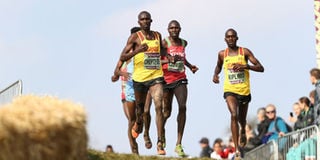Solving gender inequality not easy as ABC

Uganda's Joshua Cheptegei (left), Kenya's Geoffrey Kamworor (centre) and Uganda's Jacob Kiplimo (right) compete during the men's 10km race in the 2019 World Cross Country Championships in Aarhus, Denmark on March 30, 2019.
What you need to know:
- I welcome the idea to equalise distances, but any move must be well thought out and backed by compelling evidence, providing cogent explanations of how the move would bring positive change.
- Changing race distance alone, based merely on weak philosophies and principles about gender equality, would be an exercise in futility unless it brings real, positive change to the women involved.
Few things are certain in these precarious times. But there will always be a broken place in my heart for the horde or “woke” iconoclasts whose chief mission is to desecrate, tear down, cancel, and belittle the efforts made in the fight for gender equality in sport so far.
A new language of “equality” has emerged among sports bodies and individuals – so managerial and sophisticated, but deeply lacking in reason.
However highly evolved its jargon, one thing remains clear – most people view the issue of gender equality in sport as a ragbag of different physical needs to be met by a patchwork of half-baked solutions.
There are signs that representatives of this growing class of “destroyers” has infiltrated the athletics governing body in the United Kingdom, who earlier this week made public their plan to change the rules around the distance of race routes for men and women.
Traditionally, women have ran a shorter course in cross country races, and there has been a sustained push for the last few years to have the distances equalised.
UK Athletics argue that making the distances equal is a step toward, not against, gender equality in sport. Fair enough, but by so doing, they are succeeding only in obscuring the one true problem – the normalisation of gender inequality.
If, as a female athlete, your only choice is between running the same distances as men, which are unfavourable, and running a shorter distance that promotes competitiveness and mitigates physical harm to your body, then it is not a choice between embracing gender equality or not. You are being exploited, period.
If you are playing on a bumpy, grassless pitches every weekend, the problem lies not in your gender as a female footballer, but in the deeply entrenched culture of discrimination, which doubtless means you’re also not getting paid enough and are therefore constantly broke and frustrated.
If those things lead you to crisis, it is because you were deemed unworthy of a good match venue and favourable pay.
What am I saying? The definition of equality cannot be that tidy. It cannot be achieved by simplistic moves like harmonising race distances. Unless we adopt specific, practical measures, the enemy that is inequality will continue to reign for many more years to come.
As they grow up, men acquire a number of well-known physical advantages that create an imbalance between themselves and women.
That is why event specifications are different in some disciplines. Shorter distances don’t mean that women are weak or inferior. It is a question of what conditions work best for the different genders so that everyone, including spectators, can glean excitement from the competition.
I welcome the idea to equalise distances, but any move must be well thought out and backed by compelling evidence, providing cogent explanations of how the move would bring positive change.
Changing race distance alone, based merely on weak philosophies and principles about gender equality, would be an exercise in futility unless it brings real, positive change to the women involved.





